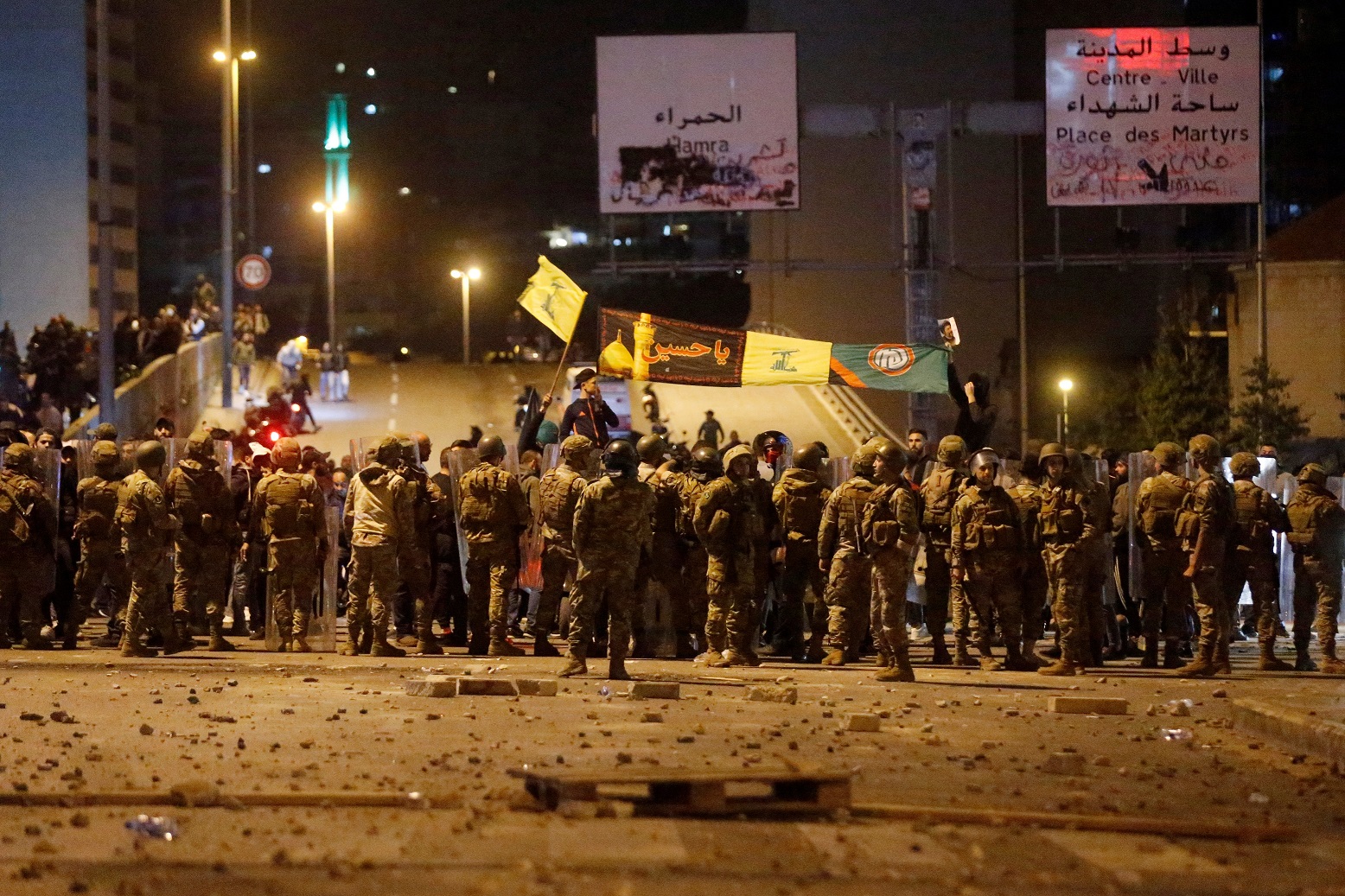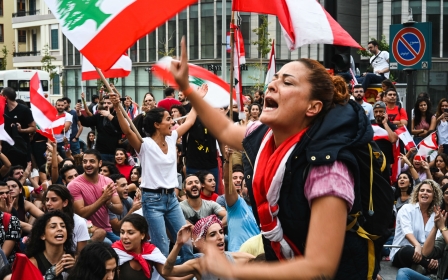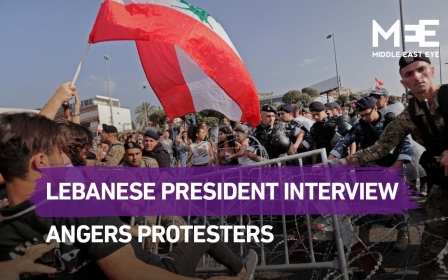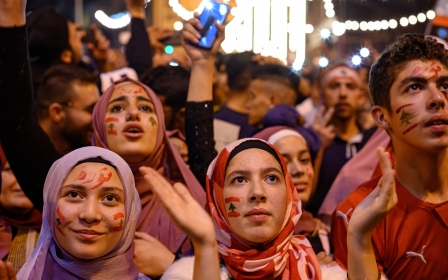Lebanon's Hariri withdraws candidacy for prime minister
Lebanon's Saad al-Hariri said on Tuesday that he did not want to be prime minister of a new government, calling his decision "frank and decisive".
President Michel Aoun will hold binding consultations with members of parliament on Thursday to designate the country's next premier, sources at the presidential palace said following Hariri's announcement.
"I am sticking by the rule 'not me, rather someone else' to form a government that addresses the aspirations of the young men and women," Hariri said in his statement.
Parliamentary consultations could take more than a day, a source from the presidential palace told local newspaper The Daily Star.
Hariri resigned on 29 October following protests that have swept Lebanon since 17 October, fuelled by deep resentment for a ruling class seen as mired in corruption and having driven the economy into crisis.
New MEE newsletter: Jerusalem Dispatch
Sign up to get the latest insights and analysis on Israel-Palestine, alongside Turkey Unpacked and other MEE newsletters
Why are the Lebanese protesting?
+ Show - HideCorruption and clientelism
Lebanon suffers under a complicated, sectarian-based power-sharing political system that has entrenched politicians and their parties in power.
Many of Lebanon's leaders are drawn from families that have dominated the political scene since its independence from France in 1943.
Parties largely claim to represent Lebanese belonging to specific confessions; parliamentary seats and top offices are divided between the 18 officially recognised sects.
However, they have largely become vehicles for corruption and clientelism and struggle to cross Lebanon's fractured political divide to reach consensus for the good of the country.
Lebanese on the streets are now calling for the removal of the entire political class.
Economic crisis
Lebanon's economy has been hit by repeated political deadlocks in recent years. Government finances are strained by a bloated public sector, debt-servicing costs and subsidising the state power producer.
Fitch ratings agency recently downgraded the country's sovereign debt, which stands at $86bn - more than 150 percent of gross domestic product - deep into junk territory.
On 2 September, Lebanon declared a state of economic emergency, vowing to speed up public finance reforms in an acknowledgement of the financial situation afflicting the country.
But the government's recent proposal of austerity measures and tax increase has angered citizens who accuse politicians of corruption, theft and leaving them behind with rising unemployment.
The crisis has caused the unofficial exchange rate to rise to 1,600 Lebanese lira to one US dollar, almost 100 lira over the officially pegged exchange rate of LL 1,507.5.
WhatsApp tax
As the Lebanese government looked to increase revenues in its 2020 budget, it decided on Wednesday to charge citizens $0.20 per day for making voice calls using online applications such as WhatsApp and Viber.
The move would have charged users $6 per month on top of already hefty telecoms bills. Lebanon has some of the highest mobile network prices in the world.
Adding to the country's list of problems - longstanding environmental crises, water and electricity shortages, crumbling infrastructure and lack of state services - is Lebanon's extremely unequal distribution of riches.
According to Lebanese newspaper Al-Akhbar, 1 percent of the wealthiest people in the country own 58 percent of Lebanon’s wealth, while the poorest 50 percent own less than 1 percent.
In a country infamous for being a fiscal haven for the ultra-rich, imposing taxes on technology used by all parts of society is a bitter pill to swallow. The government has now backed down.
Wildfires
Earlier this month, more than 100 forest fires broke out across Lebanon and the government came under heavy criticism for being unprepared to deal with the situation.
Citizens questioned why three of the country's emergency helicopters had not received maintenance work since they were purchased in 2009 at a cost of $13.9m.
Instead of firefighting helicopters, Lebanese army helicopters and civil defence teams were deployed to fight the blaze, while Cyprus, Jordan and Greece sent planes to assist.
The civil defence was forced to borrow riot control vehicles mounted with water cannons to battle the fires in the Chouf area.
The move was not well received by the Lebanese public, who criticised the government for keeping these vehicles in top condition to use against citizens during protests, instead of ensuring that life-saving equipment such as firefighting helicopters stay operational.
Since his resignation, the Lebanese political establishment has been unable to find a consensus candidate to head the government.
Earlier this month, former finance minister and billionaire businessman Mohammad Safadi was nominated by major parties.
His candidacy was short-lived, however, as it faced strong opposition by protesters who saw him as yet another corrupt political figure.
No potential candidate has emerged since, with consultations between the countries' major political powers being kept hidden from the general public. It is unclear which names will be discussed during Thursday's consultations.
A long-time ally of Saudi Arabia, Hariri has in recent years fallen out of favour with Riyadh for his apparent inability to counter Hezbollah.
In November 2017, he announced his resignation in an unexpected move while on a visit to Riyadh, sparking concerns that he was coerced.
Reports later emerged suggesting that Hariri was being held against his will by the Saudis. He rescinded his resignation after French mediation, with President Emmanuel Macron confirming that Paris had intervened to free Hariri.
Protest tents destroyed
Beirut was relatively quiet on Tuesday after clashes between supporters of Hariri and those of Hezbollah and Amal erupted into gunfire in Lebanon's capital late on Monday.
The exchanges marked the second consecutive night of violence linked to Lebanon's political crisis, threatening to tip largely peaceful demonstrations directed at the country's ruling elite in a more bloody direction.
A video posted by Lebanese broadcaster LBCI showed heavy gunfire around Cola bridge in Beirut.
The source of the gunfire was not immediately clear and no injuries were reported, the Reuters news agency said.
In the southern town of Tyre, supporters of Hezbollah and Amal tore up protest tents and set them on fire, prompting security forces to intervene and fire into the air, according to Lebanese media.
Supporters of Amal and Hezbollah have occasionally sought to break up the demonstrations and clear roads cut off by protesters. They destroyed a main protest camp in central Beirut last month.
The groups were influential in the coalition government led by Hariri and had opposed his resignation.
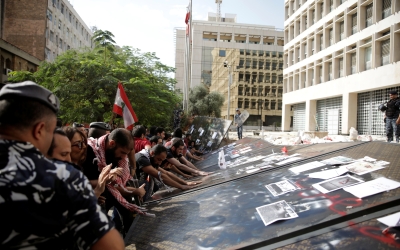
In a statement on Monday, Hariri's Future Movement warned its supporters to refrain from protesting and stay away from large gatherings to "avoid being dragged into any provocation intended to ignite strife".
Groups of men on motorcycles, some waving Amal and Hezbollah flags, were seen roving streets on Monday in Beirut and Tyre, according to witnesses and videos broadcast on Lebanese media.
Adding to tensions, two people were killed when their car slammed into a traffic barrier on a coastal road, sparking criticism from Hezbollah and others towards protesters who have cut roads as a primary tactic to keep up pressure.
Lebanon is facing its worst economic situation since the 1975-1990 civil war, amid no signs of an end to the crisis.
Middle East Eye delivers independent and unrivalled coverage and analysis of the Middle East, North Africa and beyond. To learn more about republishing this content and the associated fees, please fill out this form. More about MEE can be found here.


